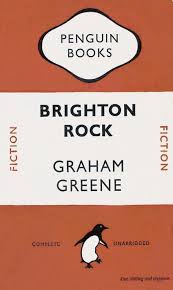Our book choice for June 2004 is Brighton Rock by Graham Greene. Brighton is a British seaside resort town and a place of contrasts. It is a place of pleasure and excitement, but it is also a place of sin and violence. The novel explores the dark side of Brighton, and it shows how the city can corrupt even the most innocent people.
The main character in Brighton Rock is Pinkie Brown, a 17-year-old boy who is a member of a gang of criminals. Pinkie is amoral and sadistic, and he is driven by a desire for power. He is also deeply religious, and he believes that he is doing God’s work by committing evil acts. Another important character in the novel is Rose, a young woman who is drawn to Pinkie’s dark charisma. Rose is naive and innocent, and she believes that she can redeem Pinkie.
The novel begins with Pinkie murdering a man named Hale. Hale was a rival gang member, and Pinkie killed him in order to protect his own position in the gang. Pinkie is then forced to flee Brighton, and he goes on the run with Rose.
While on the run, Pinkie and Rose become involved in a series of increasingly dangerous situations. They are pursued by the police, and they are also targeted by Pinkie’s former gang members. Pinkie eventually realizes that he cannot escape his past with tragic results.
Brighton Rock explores a number of themes, including evil, redemption, and the nature of faith. The novel shows how evil can be both attractive and destructive, and it suggests that redemption is possible, even for the most hardened criminals. Brighton Rock also explores the complex relationship between faith and violence. Pinkie is a deeply religious man, but his faith is twisted and perverted. He believes that he is doing God’s work by committing evil acts, and he uses his faith to justify his violence.
Discussion Questions
- Ida Arnold is concerned with right and wrong; she pieces together details of Fred’s death because it is the right thing to do. Later in the novel, Rose says that while Ida deals in right and wrong, she knows nothing of good and evil. What does Rose mean by this comment?
- Pinkie feels that Rose completes him – that she is the “good” mirror image to Pinkie’s “evil.” Can we also read the “completeness” of Rose and Pinkie as a mirror image of sadism and masochism in the novel?
Is Ida’s morality any better than that of Rose and Pinkie? Is Ida’s invesigation a search for truth, or just a way for Ida to experience some excitement in her life? - Are Pinkie and Rose damned, or is there redemption for them – a step “between the stirrup and the ground?”
- Is Greene arguing that life is deterministic, or is there a way to exert free will with the novel?
- Pinkie thinks that he cannot understand the concept of hell, since he only experienced depravity during his childhood. Does Greene argue that we are conditioned by our environment within the context of the novel?
- How does the setting of Brighton contribute to the novel’s atmosphere and themes?
- What is the significance of Kite’s murder to the story?
- What is the role of religion in the novel? How does it influence the characters’ actions and choices?
- How does the relationship between Pinkie and Rose develop over the course of the novel?
- What is the significance of the ending of the novel? Is there any hope for redemption for Pinkie and Rose?
- How does Brighton Rock reflect the social and political climate of the time in which it was written?
- What are the novel’s themes of good and evil, sin and redemption?
- How does the novel explore the nature of free will and determinism?
- What is the role of violence in the novel? How does it function as a symbol or metaphor?
- How does Brighton Rock compare to other works of crime fiction or noir literature?

